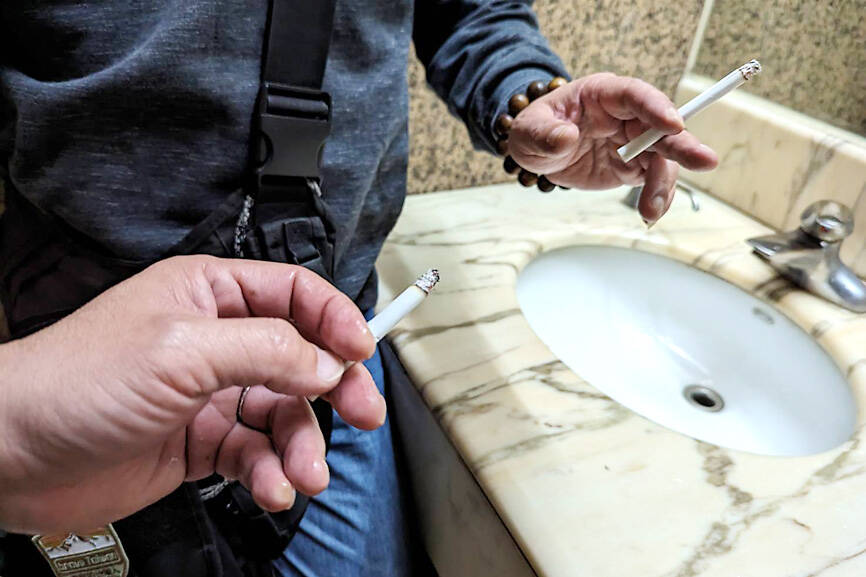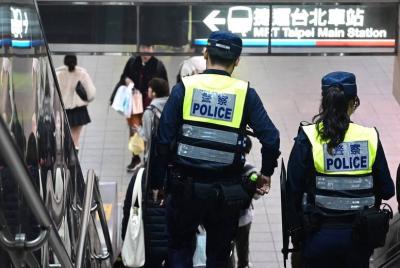Local academics and civic health groups have urged the government to follow the WHO guidelines and set a clear goal for increasing the tobacco health and welfare surcharge to effectively reduce tobacco use in Taiwan.
Based on the Tobacco Hazards Prevention Act (菸害防治法), the government needs to re-evaluate surcharge adjustments every two years with specialists in the fields of finance, economics and public health.
The surcharge has not been adjusted in the past few years, although an evaluation meeting was held in November last year.

Photo: Chiu Chih-jou, Taipei Times
Lee Yue-chune (李玉春), a professor of public health at National Yang Ming Chiao Tung University, yesterday said the tobacco surcharge adjustments in 2009 and 2017 led to a significant decrease in smoking, but it has not been increased since then.
The average price of a pack of cigarettes last year was NT$116 (US$3.66), with a tax rate of 53 percent, which is lower than the minimum tax rate of 75 percent recommended by the WHO, she said, adding that the decrease in tobacco use in Taiwan has slowed down.
Taiwan each year spends up to nearly NT$80 billion on healthcare resources to treat smoking-related illnesses, and smoking costs the economy more than NT$200 billion, Lee said.
The government needs to set clear goals for the tobacco health and welfare surcharge tax rate and increase it regularly to reduce Taiwan’s smoking population and save medical resources.
Taiwan has been slow
John Tung Foundation tobacco division director Lin Ching-li (林清麗) said most countries did not adjust their tobacco surcharge rates during the COVID-19 pandemic, but in the post-COVID-19 era, Hong Kong took the lead by raising the price of mainstream cigarette brands to about NT$304 per pack, with a tax rate of 62 percent.
The government has been acting too slowly to increase the surcharge, as the tax rate continues to remain at about 50 percent in Taiwan, she said.
Chung-Hua Institution for Economic Research deputy director Huang Shih-chang (黃勢璋) said raising the tobacco surcharge might trigger a backlash and encourage cigarette smuggling.
Therefore, the government needs to set up an automatic tobacco surcharge adjustment mechanism similar to the one in France, and gradually raise the tax rate based on national income, the inflation rate and price changes, he said.
In other developments, the Health and Promotion Administration (HPA) said that eight companies had applied to manufacture of import heated tobacco products (HTPs), as of Friday last week, but only one company submitted the complete documents required for review.
Based on amendments to the Tobacco Hazards Prevention Act, which were enacted on March 22, HTPs must pass a health risk assessment to be permitted for manufacturing, import, sales and use.
The companies need to apply for manufacturing or import approval in advance, and submit 13 documents required to conduct a health risk assessment.
As students might easily become HTP consumers, if the products are allowed to be legally sold in Taiwan, the government should strictly prohibit tobacco companies from misleading the public to believe that HTPs cause less health problems, Lin said.

Beijing could eventually see a full amphibious invasion of Taiwan as the only "prudent" way to bring about unification, the US Department of Defense said in a newly released annual report to Congress. The Pentagon's "Annual Report to Congress: Military and Security Developments Involving the People's Republic of China 2025," was in many ways similar to last year’s report but reorganized the analysis of the options China has to take over Taiwan. Generally, according to the report, Chinese leaders view the People's Liberation Army's (PLA) capabilities for a Taiwan campaign as improving, but they remain uncertain about its readiness to successfully seize

Taiwan is getting a day off on Christmas for the first time in 25 years. The change comes after opposition parties passed a law earlier this year to add or restore five public holidays, including Constitution Day, which falls on today, Dec. 25. The day marks the 1947 adoption of the constitution of the Republic of China, as the government in Taipei is formally known. Back then the Chinese Nationalist Party (KMT) governed China from Nanjing. When the KMT, now an opposition party in Taiwan, passed the legislation on holidays, it said that they would help “commemorate the history of national development.” That

Taiwan has overtaken South Korea this year in per capita income for the first time in 23 years, IMF data showed. Per capita income is a nation’s GDP divided by the total population, used to compare average wealth levels across countries. Taiwan also beat Japan this year on per capita income, after surpassing it for the first time last year, US magazine Newsweek reported yesterday. Across Asia, Taiwan ranked fourth for per capita income at US$37,827 this year due to sustained economic growth, the report said. In the top three spots were Singapore, Macau and Hong Kong, it said. South

Police today said they are stepping up patrols throughout the Taipei MRT system, after a social media user threatened to detonate a bomb at an unspecified station this afternoon. Although they strongly believe the threat to be unsubstantiated, Taipei Metro police and the Railway Police Bureau still said that security and patrols would be heightened through the system. Many copycat messages have been posted since Friday’s stabbing attacks at Taipei Main Station and near Zhongshan MRT Station that left three dead and 11 injured, police said. Last night, a Threads user in a post said they would detonate a bomb on the Taipei